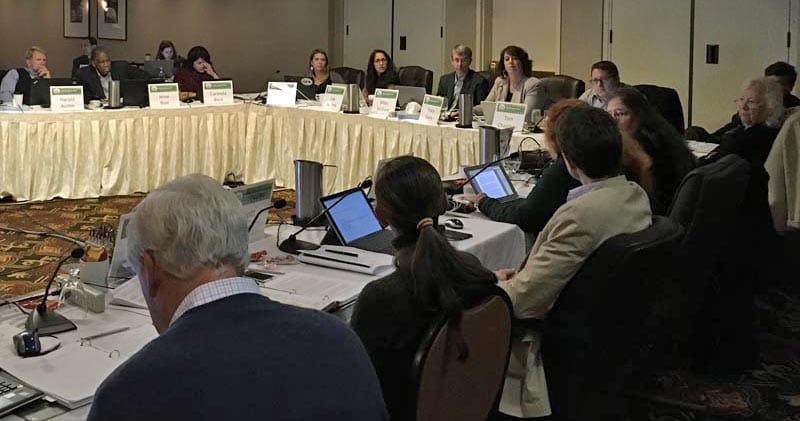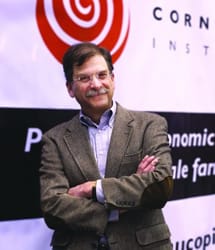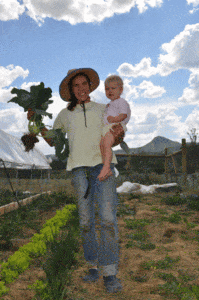Farmers, Consumers, Nonprofits Challenge Mounting Agribusiness Dominance
Will Industrial-Scale Hydroponic (soil-less) Production or Allowing Plastic Contamination of Organic Farmland be Sanctioned?
 |
Advocates for organic food and farming are, increasingly, victims of their own success. Over the past 25 years, this grassroots movement has morphed into a $43 billion industry, turning the biannual National Organic Standards Board (NOSB) meetings into a struggle between representatives of organic farmers and consumers and powerful agribusiness lobbyists. The spring meeting in Denver starts on April 19 and could decide who influences the regulations that determine the working definition of the USDA’s organic seal.
On the meeting’s docket is the highly controversial question of whether to legalize hydroponic production of organic fruits and vegetables, which are generally grown in industrial-scale greenhouses with liquid fertilizer instead of nutrient-rich soil. Also up for debate will be allowing “biodegradable” plastic mulch, without scientific evidence to assure organic consumers that toxic and synthetic residues left in the soil will not end up in organic crops or negatively impact the environment.
The NOSB was created by Congress as a 15-member independent advisory panel with statutory authority to help create the regulations that govern organic food and farming. Public interest advocates have long accused the Bush and Obama administrations of stacking the panel with members and supporters of the powerful industry lobby group, the Organic Trade Association (OTA). The young Trump administration has yet to leave their mark on the organic regulatory environment.
 |
“We thought the situation was bad during the Bush era, but the Obama administration truly perfected creating the illusion of a broad-based, public-private partnership that Congress had envisioned for organic rulemaking,” said Mark A. Kastel, Codirector of the Wisconsin-based Cornucopia Institute, widely recognized as one of the industry’s most aggressive watchdogs.
“What started out with great hope as a collaborative process with the passage of the Organic Foods Production Act in 1990 has matured into an adversarial process pitting true believers in the foundational values of organics against raw corporate power,” Kastel added.
In conjunction with the spring meeting, The Cornucopia Institute released an updated scorecard of the voting records of all NOSB members, which shows a wide disparity between independent voices on the panel and those with an affiliation to the OTA.
No recent issue has represented the divide in organics more aptly than whether or not hydroponic growing, in greenhouses or containers, should be legalized. Even though organic regulations clearly require organic farmers to carefully manage and improve soil fertility, major USDA accredited organic certification agencies have quietly certified over 100 giant hydroponic facilities in the U.S., Mexico, Canada, and Europe as organic.
 |
“Almost exclusively, the laws in countries exporting to the U.S. do not approve organic labeling of hydroponics for their own markets,” said Linley Dixon, PhD, Cornucopia’s Senior Scientist and Policy Director. “In terms of the international organic industry, the U.S. is truly an outlier on this hydroponics issue.”
The Cornucopia Institute and other organic and sustainable farm policy groups do not necessarily object to hydroponic growing in general, but they are strongly opposed to labeling soil-less production as “organic.” They point to the potential legal violation of the law, as well as alleging it is an inherently deceptive practice depriving consumers looking for more flavorful and nutritious food, believing rich organic soil is a fundamental production requirement.
“Few beyond the hydro producers, their lobbyists, and their certifiers believe these products should actually be certified organic,” said Dave Chapman, a pioneering soil-based greenhouse grower from East Thetford, Vermont. “There is no consumer outcry calling for hydroponics. But as people find out what is being sold to them as organic, there will be an outcry of anger from many organic supporters.”
To substantiate Chapman’s claim, Cornucopia conducted an analysis of the more than 2,000 formal public comments from organic stakeholders that were submitted to the NOSB prior to the spring meeting. Almost half of the comments pertain to hydroponics. Of these, approximately three-quarters do not want hydroponic growing to be labeled organic. Comments in favor of organic hydroponics were almost exclusively from individuals with a direct economic stake in hydroponics — growing, marketing or certifying hydroponic produce, or selling “organically approved” fertilizers for use in hydroponic systems.
In tracking the comments, Cornucopia noted that the industry is making a concerted effort to change the language in the debate. The hydroponic industry is using an invented word, “bioponics,” that doesn’t appear in scientific or agricultural industry literature. They have also started calling their operations “container growing,” rather than hydroponics, even though liquid fertilizer is continuously delivered to plants in these operations.
“If the thirty thousand acres of conventional hydroponic production gains access to the organic label—with only minimal changes in production practices—that will signal the end of the diversified, regenerative, certified-organic family farm,” said Dixon.
The second hot button issue at the meeting is the proposal to allow the use of “biodegradable” plastic sheeting, or “mulch.” This plastic mulch is comprised of only 10-20% plant-based materials. Instead of removing the sheeting from the fields each season, as is currently required by law, a proposed rule change would allow letting the plastic film “biodegrade.” Plastic mulch is used by organic farmers to help warm the soil early in the growing season, control weeds, and retain moisture.
“The real problem with this proposal is the lack of any current research indicating what happens with the synthetic components of so-called biodegradable bio-mulches, which make up the majority of the material,” said Jerome Rigot, PhD, a Cornucopia scientist who prepared the organization’s comments on the issue.
It is known that some plants readily take up natural or man-made compounds in the soil. As an example, rice is very efficient at absorbing arsenic residues in soil, and incorporating them into their tissues, even years after the carcinogen was used as a pesticide.
Rigot added, “Although this material might break down in the environment into smaller, or even microscopic, pieces, it may very well add significant amounts of synthetic chemicals over time to the soil and possibly create toxicity for plants subsequently grown in the same fields.”
In addition to its potential effects on human health, the impact of bioplastics, and their breakdown constituents, on the microbiome of the soil is unknown. At a time when soil health is on the forefront of organic growers’ and consumers’ minds, introducing unknown and potentially damaging soil toxins would further jeopardize the integrity of the organic label. The Cornucopia Institute has formally asked the NOSB not to give the green light to these products until their use is proven safe.
Cornucopia’s scientific and legal analyses of key issues on the agenda for the upcoming meeting were included in the organization’s formal comments to the NOSB, and are publicly available at Cornucopia.org.
The semiannual NOSB meeting will be held April 19 through 21 at the Sheraton Hotel in downtown Denver, Colorado, and is open to the public.
MORE: The majority of NOSB members have direct and indirect ties to the Organic Trade Association. The Cornucopia Institute has a lawsuit pending in federal court challenging the appointment of two agribusiness employees to seats that Congress had earmarked for individuals who “owned or operated” organic farms.
“After challenging the legality of some past USDA appointments, the department started wising up, to a point,” Cornucopia’s Kastel stated. “They are no longer risking a court challenge by appointing technically unqualified individuals, but some board appointments are still violating the spirit of what Congress was trying to accomplish.”
Kastel uses the example of two farmers who started their terms on the NOSB in 2016. “Emily Oakley operates a 20-acre farm and has been certified organic for 10 years. On contested issues, she most often votes in congruence with the recommendations of the major nonprofit organizations that monitor organics in the public interest.” As a result, Oakley has a 91% voting record on Cornucopia’s NOSB Member Voting Scorecard.
In contrast, the other 2016 farmer-appointee, Jesse Buie, is a healthcare industry consultant, who was growing just a few acres of organic crops for only three years prior to his appointment.
Buie’s votes are less than 10% in concert with the public interest recommendations made by Cornucopia and other non-governmental organizations (NGOs), including Consumers Union, Beyond Pesticides, Center for Food Safety, and the National Organic Coalition, among others.
“We do not think it is a coincidence that Mr. Buie is one of the rare farmers, joining with predominantly food businesses, who is a member of the OTA, and the only farmer in Mississippi certified by California’s CCOF, the nation’s largest certifier and listed as a top-tier OTA donor,” Kastel said.
Based on documents obtained by The Cornucopia Institute, through Freedom of Information requests, it is all too common for the USDA to pass over farmers, and other industry stakeholders, with decades of experience and impressive policy backgrounds, and instead appoint industry-friendly individuals to the NOSB.
“We welcome board members, who are serving in good faith but might have been influenced by their OTA-dominated colleagues on the board, to speak to us or representatives of the other NGOs, for a countervailing view on both the macro and micro issues coming before the board,” stated Kastel.
Key issues before the NOSB at the spring meeting include:
- Converting Native Ecosystems To Organic Production
It is disturbing to many organic stakeholders that organic regulations actually encourage the immediate conversion of native lands to organic crop production because doing so eliminates the three-year transition period required when converting from conventional cropland. Prohibiting the conversion of any native ecosystem to organic production is the best solution. Cornucopia proposes, at a minimum, that an eligibility period of at least five years (instead of the current zero years) would de-incentivize the conversion of these high-value, irreplaceable lands.
- Sunset of Copper-based Pesticides
Copper products are among the most hazardous materials for workers used in organic production. The NOSB should recommend measures to ensure copper products are used only (as fungicides) when absolutely necessary and that they do not leave visible residues on crops in the field.Cornucopia’s Dixon states, “‘Organic’ monoculture tomato farms use regular prophylactic copper sprays, often on a weekly basis throughout the season, rather than attempting to control plant diseases with greater crop diversity and lower plant density. The over-use of copper in monoculture tomato production in humid areas generates significant criticism outside the organic industry.”
- Tocopherols
This issue encompasses the core responsibility of the NOSB—continuous improvement of the National List [of approved substances] away from synthetics when natural or organic forms are commercially available. Currently, synthetic tocopherols, a form of vitamin E, are approved for use as a preservative in organic food. Unfortunately, the NOSB, at this meeting, is only voting on whether or not to add a commercial availability clause to the synthetic listing. Cornucopia believes synthetic tocopherols should be removed from the National List to incentivize the increase in the commercial availability of natural and organic tocopherols. Consumers don’t want to buy organic food with non-organic ingredients when organic options are available.
- Defining Emergency use of Parasiticides for Controlling Parasites in Livestock
More examination of the withholding times after an animal is given synthetic parasiticides is needed. There is still not enough data to determine whether the dairy, meat, and fiber produced by livestock given synthetic parasiticides is free of those chemicals.
- BPA in packaging
Numerous peer-reviewed studies show that bisphenol A (BPA) is an endocrine-disrupting chemical and is linked to a multitude of adverse health effects, including cancer, obesity, diabetes, neurological and behavioral problems, and reproductive issues. Cornucopia is encouraged by the NOSB’s Handling Subcommittee’s request for information, but is troubled by how long it might take to finally pass regulations preventing the use of BPA packaging in any product labeled organic.
- Sunset of Lidocaine, Procaine (anesthetics used to control pain in livestock)
It is the job of the NOSB to remove products from the National List that have better alternatives. The anesthetic procaine, labeled by the FDA for use in livestock, is such an example because it is not as widely available or as effective as lidocaine. There is no benefit to using procaine over lidocaine, so having it on the National List likely creates confusion.
- Evaluating Inspectors
Organic certifying agencies, accredited by the USDA, are currently required to evaluate, in the field, each of their inspectors every year. Cornucopia supports the reasonable modification of this rule to every three years provided that other additional oversight, and continuing educational requirements for inspectors, are enhanced and enforced.
- Hydroponics
The NOP decision on whether or not hydroponics is organic will affect the organic movement throughout the world, due to bilateral trade agreements. With the exception of three Nordic EU member states, the rest of the world does not allow hydroponic production to be certified organic. Nor do they permit organic crops to be grown to maturity in containers fertilized primarily with liquid nutrients.In order to gain access to the coveted organic label, the hydroponic lobby has intentionally created confusion about the difference between growing strictly in water and growing in a soil-less substrate such as coco coir, which is then fertilized with a nutrient solution. In the conventional world of greenhouse vegetable production, both systems are considered “hydroponic.”
- Biodegradable Biobased Plastic Mulch
The NOSB should reaffirm a 2012 NOSB decision that establishes the parameters for 100% biobased mulch to protect organic crops from contamination and adverse effects to soil ecology.

